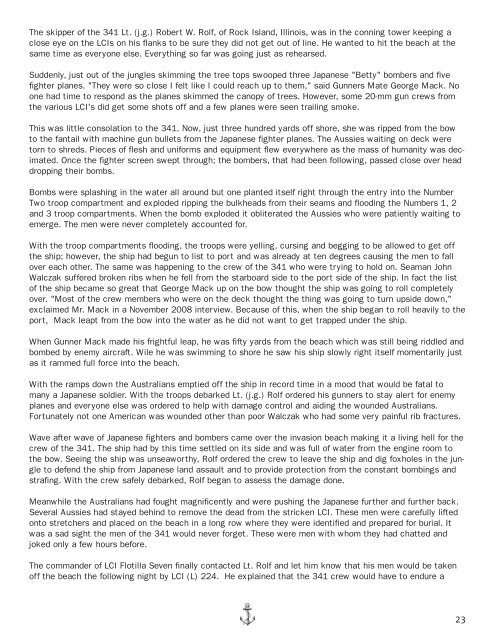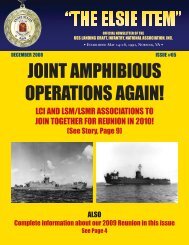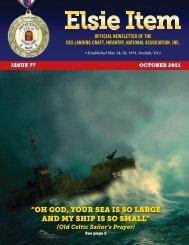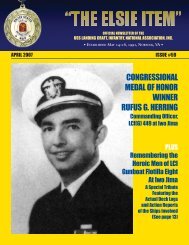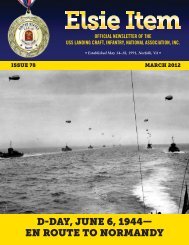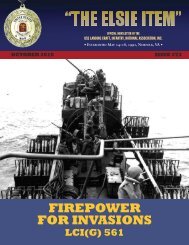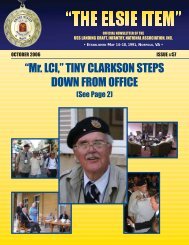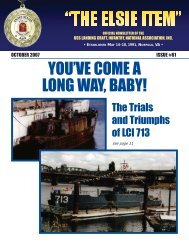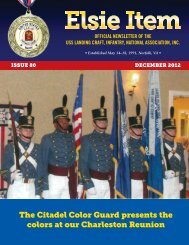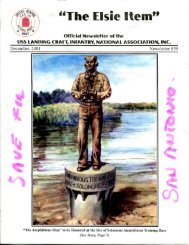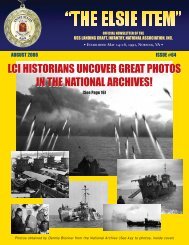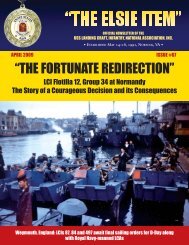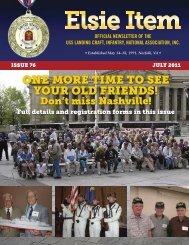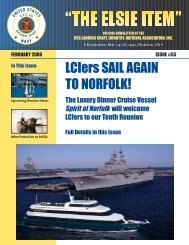elsie item issue 66 - USS Landing Craft Infantry National Association
elsie item issue 66 - USS Landing Craft Infantry National Association
elsie item issue 66 - USS Landing Craft Infantry National Association
Create successful ePaper yourself
Turn your PDF publications into a flip-book with our unique Google optimized e-Paper software.
The skipper of the 341 Lt. (j.g.) Robert W. Rolf, of Rock Island, Illinois, was in the conning tower keeping a<br />
close eye on the LCIs on his flanks to be sure they did not get out of line. He wanted to hit the beach at the<br />
same time as everyone else. Everything so far was going just as rehearsed.<br />
Suddenly, just out of the jungles skimming the tree tops swooped three Japanese "Betty" bombers and five<br />
fighter planes. "They were so close I felt like I could reach up to them," said Gunners Mate George Mack. No<br />
one had time to respond as the planes skimmed the canopy of trees. However, some 20-mm gun crews from<br />
the various LCI's did get some shots off and a few planes were seen trailing smoke.<br />
This was little consolation to the 341. Now, just three hundred yards off shore, she was ripped from the bow<br />
to the fantail with machine gun bullets from the Japanese fighter planes. The Aussies waiting on deck were<br />
torn to shreds. Pieces of flesh and uniforms and equipment flew everywhere as the mass of humanity was decimated.<br />
Once the fighter screen swept through; the bombers, that had been following, passed close over head<br />
dropping their bombs.<br />
Bombs were splashing in the water all around but one planted itself right through the entry into the Number<br />
Two troop compartment and exploded ripping the bulkheads from their seams and flooding the Numbers 1, 2<br />
and 3 troop compartments. When the bomb exploded it obliterated the Aussies who were patiently waiting to<br />
emerge. The men were never completely accounted for.<br />
With the troop compartments flooding, the troops were yelling, cursing and begging to be allowed to get off<br />
the ship; however, the ship had begun to list to port and was already at ten degrees causing the men to fall<br />
over each other. The same was happening to the crew of the 341 who were trying to hold on. Seaman John<br />
Walczak suffered broken ribs when he fell from the starboard side to the port side of the ship. In fact the list<br />
of the ship became so great that George Mack up on the bow thought the ship was going to roll completely<br />
over. "Most of the crew members who were on the deck thought the thing was going to turn upside down,"<br />
exclaimed Mr. Mack in a November 2008 interview. Because of this, when the ship began to roll heavily to the<br />
port, Mack leapt from the bow into the water as he did not want to get trapped under the ship.<br />
When Gunner Mack made his frightful leap, he was fifty yards from the beach which was still being riddled and<br />
bombed by enemy aircraft. Wile he was swimming to shore he saw his ship slowly right itself momentarily just<br />
as it rammed full force into the beach.<br />
With the ramps down the Australians emptied off the ship in record time in a mood that would be fatal to<br />
many a Japanese soldier. With the troops debarked Lt. (j.g.) Rolf ordered his gunners to stay alert for enemy<br />
planes and everyone else was ordered to help with damage control and aiding the wounded Australians.<br />
Fortunately not one American was wounded other than poor Walczak who had some very painful rib fractures.<br />
Wave after wave of Japanese fighters and bombers came over the invasion beach making it a living hell for the<br />
crew of the 341. The ship had by this time settled on its side and was full of water from the engine room to<br />
the bow. Seeing the ship was unseaworthy, Rolf ordered the crew to leave the ship and dig foxholes in the jungle<br />
to defend the ship from Japanese land assault and to provide protection from the constant bombings and<br />
strafing. With the crew safely debarked, Rolf began to assess the damage done.<br />
Meanwhile the Australians had fought magnificently and were pushing the Japanese further and further back.<br />
Several Aussies had stayed behind to remove the dead from the stricken LCI. These men were carefully lifted<br />
onto stretchers and placed on the beach in a long row where they were identified and prepared for burial. It<br />
was a sad sight the men of the 341 would never forget. These were men with whom they had chatted and<br />
joked only a few hours before.<br />
The commander of LCI Flotilla Seven finally contacted Lt. Rolf and let him know that his men would be taken<br />
off the beach the following night by LCI (L) 224. He explained that the 341 crew would have to endure a<br />
23


